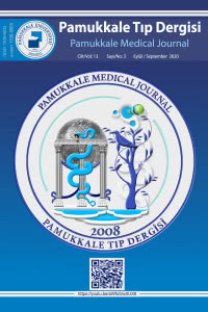İnguinal herni hastalarında açık mı kapalı teknik mi daha fazla stres yaratır ?
AMAÇ: İnguinal herni her iki cinste, tüm ırklarda, her yaşta sık görülen bir hastalıktır ve tedavisi cerrahidir. Cerrahi girişimlerde ana gayelerden biri travmayı en aza indirmektir. Çalışmamızda laparoskopik (Laparoskopik total ekstraperitoneal teknik) ve açık (Lichtenstein tekniği) inguinal herni ameliyatlarında travma ve strese cevabı yansıtabilecek bazı kan parametrelerini ameliyat öncesi ve sonrası ölçerek bu iki ameliyat tekniği arasında hastaların maruz kaldığı travma düzeylerinin farklılık gösterip göstermediğini saptamayı amaçladık. GEREÇ VE YÖNTEM: Randomize çalışmada kliniğimizde inguinal herni tanısı konulan 40 hastanın 20’sine laparoskopik total ekstraperitoneal tekniğiyle, diğer 20 hastaya da açık teknikle greftli herni onarımı ameliyatı yapıldı. Çalışmaya alınan olgularda ameliyat öncesi, ameliyat sırasında, ameliyat sonrası ikinci ve yirmi dördüncü saatlerde antekubital venöz kan alındı. Kanda growth hormon, kortizol ve malonildialdehit düzeylerine bakıldı. Bulgular: Grupların; yaş cinsiyet ve vücut kitle indeksleri arasında istatistiksel fark saptanmadı (sırasıyla; p=0.78, p=0.429, p=0.616). Growth hormon düzeyleri her iki teknikte de peroperatif yükselirken, postoperatif 2. saatte açık teknikle yükselme devam etti fakat laparoskopik yöntemle anlamlı düşüş saptandı (p= 0.005). Kortizol değerleri her iki ameliyatta preoperatif anlamlı olarak yüksek saptanırken laparoskopik teknikte postoperatif 2. saatte (p=0.07), açık teknikte postoperatif 24. saatte (p=0.006) anlamlı düşme saptandı. Malonildialdehit değerleri arasında preoperatif, peroperatif, postoperatif 2 ve 24. saatler arasında anlamlı farklılık yoktu. Fakat her iki teknik karşılaştırıldığında açık teknikte malonilaldehit değeri anlamlı olarak yüksek saptandı (p=0.038). SONUÇ: İnguinal herni ameliyatları için laparoskopik yaklaşım günümüzde altın standart olarak kabul edilmemektedir. Çalışmamızda, laparoskopik girişimlerde, açık ameliyatlara göre sınırlı da olsa stres ve cerrahi travma daha düşük gözükmektedir. Bununla birlikte cerrahi yöntem seçiminde hastanın genel durumu ve tercihi ile cerrahın tercihinin daha önemli olduğu düşüncesindeyiz.
Anahtar Kelimeler:
İnguinal herni, laparoskopik herni onarımı, greftli açık herni onarımı, stres hormonları
Which Operative Technique is Associated with Higher Levels of Stress?
OBJECTIVE: Inguinal hernia is a prevalent condition among people of every sex, age and race and the treatment is surgery (1). One of the main goals during the surgery is to minimize surgical trauma. In this study, we aimed at finding out whether the intensity of surgical trauma differ between open inguinal hernia repair surgery and laparoscopic total extraperitoneal inguinal hernia repair surgery by measuring preoperative and postoperative levels of certain blood parameters that might reflect the intensity of trauma and response to trauma.MATERIALS-METHODS: A total of 40 patients who underwent inguinal hernia repair surgery were included in the study. 20 out of 40 patients underwent a laparoscopic total extraperitoneal inguinal hernia repair and 20 underwent open inguinal hernia repair. Blood samples were taken from the antecubital vein before the surgery, during the surgery, at hour 2 and hour 24 after the surgery and blood growth hormone, cortisol and malonyldialdehyde levels were measured.RESULTS: Elevated growth hormone levels were detected during the surgery by either technique. Growth hormone levels continued to increase at hour 2 in patients who underwent open surgery while a significant decrease was detected at hour 2 in patients who underwent laparoscopic surgery (p= 0,053). Preoperative blood cortisol levels were found to be significantly elevated in both groups and significant reductions were detected at hour 2 after the surgery in patients who underwent laparoscopic repair (p=0.07) while significant reductions were detected in patients who underwent open repair at hour 24 after the surgery ( p=0.006). No significant differences were detected among blood malonyldialdehyde concentrations measured before the surgery, during the surgery and at hour 2 and hour 24 after the surgery. However intergroup comparisons revealed that blood malonyldialdehyde concentrations were significantly higher in the open surgery group (p=0.038). CONCLUSION: Although laparoscopic surgery is not considered a gold standard for inguinal hernia repair, this approach may be the surgery of choice for inguinal hernia repair, particularly in cases of recurrent and bilateral inguinal hernia, as this technique is associated with lower levels of stress and trauma.
___
- 1. Öberg S, Andresen K, Rosenberg J. Etiology of Inguinal Hernias: a Comprehensive Review. Front Surg 2017;22(4):52. PMID: 29018803.
- 2. Roser P, Wehrhahn T, Krogmann H, Riedel N, Marshall RP, Gille J, Flitsch J, Aberle J. Somatotrope Pituitary Function in Professional Soccer Players. Exp Clin Endocrinol Diabetes 2018;126(5):306-308. PMID: 29165725.
- 3. Şimşek Ş, Kaplan İ, Uysal C, Yüksel T, Alaca R. The Levels of Cortisol, Oxidative Stress, and DNA Damage in the Victims of Childhood Sexual Abuse: a Preliminary Study. J Child Sex Abus 2016;25(2):175-184. PMID: 26934543.
- 4. Cao Z, Chen L, Liu Y, Peng T. Oxysophoridine rescues spinal cord injury via anti‑inflammatory, anti‑oxidative stress and anti‑apoptosis effects. Mol Med Rep 2018;17(2):2523-2528. PMID: 29207118.
- 5. Xu YJ, Yu ZQ, Zhang CL, Li XP, Feng CY, Lei K, He WX, Liu D. Protective Effects of Ginsenosides on 17[Formula: see text]-Ethynyelstradiol-Induced Intrahepatic Cholestasis via Anti-Oxidative and Anti-Inflammatory Mechanisms in Rats. Am J Chin Med 2017;45(8):1613-1629. PMID: 29121800.
- 6. Karayiannakis AJ, Makri GG, Mantzioka A Karousos D, Karatzas G: Systemic stress response cholecystectomy: a randomized trial. Br J Surg 1997; 84:467–471. PMID: 9112894.
- 7. Naito Y, Tamai S, Shingu K, Shindo K, Matsui T, Segava H, et al. Responses of plasma adrenocorticotropic hormone , cortisol and cytokines during and after upper abdominal surgery. Anesthesiology 1992;77:426 – 431. PMID: 1355636.
- 8. Halwell B: Reactive oxygen species in living systems: source, biochemisy and role in human disease. Am J Med 1991;91:14 –22. PMID: 1928205.
- 9. Timerbaev VKH, Kontarev SI, Mil’chakov VI, Demurow EA, Fedorova Ev, Belov V, et al. Lipid Peroxidation processes in the blood of patients during thoracic surgery. Anesthesiol Reanimatol 1993;6:18–20. PMID: 8185066.
- 10. Redmond HP, Watson RWG, Houghton T, Condron C, Watson RGK, Bouchier Hayes D: Immune function in patients undergoing open vs laparoscopic cholecystectomy . Arch Surg 1994;129:1240–1246. PMID: 7986152.
- ISSN: 1309-9833
- Yayın Aralığı: 4
- Başlangıç: 2008
- Yayıncı: Prof.Dr.Eylem Değirmenci
Sayıdaki Diğer Makaleler
İnguinal herni hastalarında açık mı kapalı teknik mi daha fazla stres yaratır ?
